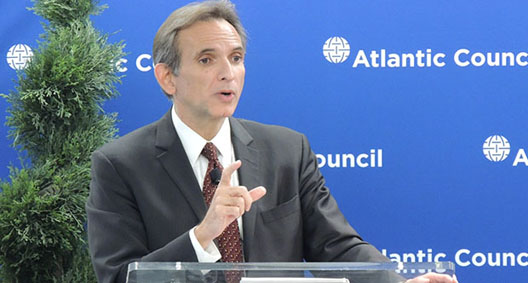 Carlos Pascual, the US special envoy for international energy affairs, on April 3 urged Europe to keep building pipelines and policies to create a truly competitive European market in natural gas. Pascual spoke at the Atlantic Council days after returning from meetings in Ukraine, Belgium and Moldova with government and private-sector officials, and representatives of civil society.
Carlos Pascual, the US special envoy for international energy affairs, on April 3 urged Europe to keep building pipelines and policies to create a truly competitive European market in natural gas. Pascual spoke at the Atlantic Council days after returning from meetings in Ukraine, Belgium and Moldova with government and private-sector officials, and representatives of civil society.
Ever since January 2009, when Russia cut off gas supplies to Ukraine and much of Europe over a payment dispute, the European Union and its members have been building a more efficient marketplace for gas to reduce their dependence on Russian supplies, Pascual noted. Europe “has made a huge investment in infrastructure,” notably interconnecting pipelines to allow easier movement of gas around the continent, he said. And the EU outlawed “destination clauses” in Russian gas-supply contracts that previously had barred European countries from selling Russian gas onward to other buyers. Those steps, plus greater gas supplies from Norway, Algeria and the United States, have given Europe greater “market leverage over Gazprom,” the Russian gas provider, Pascual said.
Pascual called for further steps specifically to help Ukraine, which has faced gas cutoffs and, in its current confrontation with Russia, price increases from Gazprom. He noted that Ukraine can receive almost three billion cubic meters (bcm) of gas annually through pipelines from Poland and Hungary (called “reverse-flow” imports because they travel eastward, rather than crossing Ukraine westward, as the larger Russian flows have done for years). The completion of a pipeline from Slovakia would let that country move another seven billion bcm to Ukraine each year, for a total of ten billion bcm, or 20 percent of Ukraine’s gas needs, supplied from non-Russian sources. The increased competition reduces Ukraine’s dependence on Russia and further integrates Ukraine into European energy networks, Pascual said.
Pascual underscored the importance of expanding US exports of liquid natural gas (LNG) in helping to create more competitive energy marketplaces for Ukraine and Europe.
“If I can leave you with one particular message, it is the importance of competition,” he told the audience. “If you have a market of 400 million Europeans that can embrace and incorporate Ukraine – and in that market, if those countries have a choice in their supplies, they can use that market power to reinforce their independence and break the ability of individual suppliers to use energy as a tool that affects the political choices that they want to make for the future. And so to the extent to which you can keep reinforcing … competition and resiliency, that is probably one of the most important things that we can do.”
